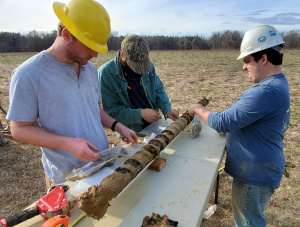Ole Miss geological engineering students learn about geologic mapping and assist Charleston, MS with economic development potential
The Mississippi Mineral Resources Institute (MMRI) and Department of Geology and Geological Engineering at Ole Miss are undertaking a geologic mapping and drilling project in Charleston, Mississippi – that’ll help identify economic resources and contribute to scientific research in the region.
 The U.S. Geological Survey is funding the educational mapping project, which is designed to teach students geologic-mapping techniques through rigorous field mapping.
The U.S. Geological Survey is funding the educational mapping project, which is designed to teach students geologic-mapping techniques through rigorous field mapping.
Why Charleston, Mississippi?
Ron Counts, MMRI associate director and research assistant professor, chose the Charleston 7.5 minute quadrangle for scientific, logistic and socioeconomic reasons.
“Scientifically, the quadrangle includes the transition from the upland hill country to the Delta, and mapping this area has the potential to contribute to multiple scientific endeavors, including improving our understanding of how the Mississippi Embayment has evolved over time,” Counts said.
“Logistically, the quadrangle is only about 50 miles from Oxford and is easy to get to, allowing us to maximize our time in the field. The socioeconomic reasons were that the hills of the map area contain gravel deposits, which are an economic resource, and the unconfined aquifer in the Delta is the second-most valuable aquifer in the country in terms of agriculture and industry.”
Benefits of geological mapping
Quadrangle-scale geologic mapping compiles all existing geologic data and uses fieldwork and drilling to verify the accuracy of the existing data and to provide new data to areas that lack information.
Using a new drill, the drillers are implementing and testing modifications to improve core recovery. The cores range from 8 to 10 meters in depth.
The drilling would help identify potential locations to open new gravel pits that could be used for economic development in the area. Charleston is one of the three communities involved with M Partner, an Ole Miss initiative that seeks to match university capabilities with the goals and needs of local communities.